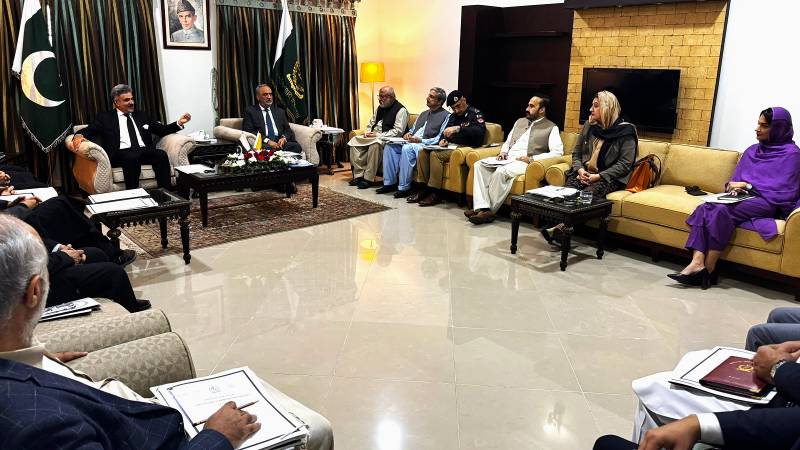
Jails in Khyber Pakhtunkhwa lack any facility to rehabilitate convicts before they are released back into society after completing their sentences.
This was disclosed by Peshawar High Court's Chief Justice Ishtiaq Ibrahim on Friday during a consultative meeting with Chief Justice of Pakistan Yahya Afridi in Peshawar.
The CJP Afridi chaired the meeting. Other participants of the meeting included Peshawar High Court (PHC) Chief Justice Ishtiaq Ibrahim, PHC Administrative/Monitoring Judge for
Prisons Justice Ijaz Anwar Khan, PHC's former judge Justice Qalandar Ali Khan, Khyber Pakhtunkhwa (KP) Advocate General Shah Faisal Utmankhel, KP Home and Tribal Affairs Department Additional Chief Secretary Muhammad Abid Majeed, KP Inspector General of Police Akhtar Hayat Khan, KP Inspector General Prisons Muhammad Usman, Supreme Court Registrar Muhammad Salim Khan, Peshawar High Court Registrar Iftikhar Khan, and Law and Justice Commission of Pakistan (LJCP) Secretary Riffat Inam Butt. Others who participated in the session included Social worker and activist Ayesha Bano and members of the provincial government and the provincial assembly including KP Minister for Housing Amjad Ali, MPA Fazal Shakoor Khan and MPA Ahmad Karim Kundi.
The meeting was part of a series of nationwide discussions initiated earlier this month by CJP Afridi in Lahore and Islamabad to formulate a comprehensive National Jail Reforms Policy. Thus, the agenda of the meeting focused on prison reforms and inmate welfare as key components of a broader strategy to modernise Pakistan's criminal justice system.
PHC Chief Justice Ibrahim highlighted the province's lack of rehabilitation facilities for convicts. He stressed the need to develop a strong rehabilitation system to absorb convicts into society.
He also proposed sentence remissions for inmates who achieve educational excellence during their confinement, aligning with their broader rehabilitation goals.
During Friday's meeting, participants also stressed the importance of expanding prison-based rehabilitative programmes, including vocational training, mental health support, and educational initiatives, to facilitate inmates' reintegration into society upon release.
Moreover, it was also urged that the forensic science facilities in the province may be upgraded.
Earlier, Chief Justice Yahya Afridi explained the need for prison reforms and the series of consultations he had undertaken to develop a robust national prison reforms policy. He underscored the need for a just and equitable criminal justice framework, emphasising that a humane and efficient prison system forms its backbone.
He appreciated the current level of prison management in Khyber Pakhtunkhwa, noting that over the past three months, some 1,289 prisoners charged with minor offences had been released through camp courts, which judicial officers had conducted. He urged other provinces to replicate these efforts to alleviate overcrowding in prisons.
The meeting also focused on LJCP's proposed National Jail Reform Policy, which aligns with international standards including the Nelson Mandela Rules, Bangkok Rules, and Beijing Rules. The policy aims to ensure the humane and rehabilitative management of correctional facilities across Pakistan.
Participants of the meeting expressed strong support for the proposal, emphasising the importance of alternative sentencing options and rehabilitation programmes for under-trial prisoners.
Jail reforms committee
A significant outcome of the meeting was the recommendation to establish a Jail Reforms Committee to address pressing issues such as overcrowding, inmate welfare, and case processing delays. The proposed Terms of Reference (ToRs) for a National Committee were also discussed, focusing on reducing under-trial detention, improving case management, and implementing comprehensive rehabilitation initiatives.
To accelerate these efforts, CJP Yahya Afridi announced to form a sub-committee for KP, comprising Ayesha Bano (who will also act as the committee's coordinator), MPAs Fazal Shakoor Khan, Ahmad Karim Kundi, Amjad Ali, and a representative of the Inspector General of Prisons. This sub-committee has been tasked with compiling a report on the situation currently prevailing in jails of the province with respect to various categories of inmates confined there. This report will be submitted to Justice (Retired) Qalandar Ali Khan for oversight and guidance. The report's findings are expected to contribute to the formulation of the national prison reforms policy, which shall be based on the feedback received from all the provinces.
The subcommittee's priorities will include making recommendations for reducing the number of under-trial prisoners and promoting alternative sentencing options such as community service and probation.

